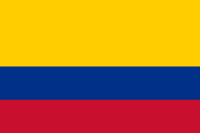
Photo from wikipedia
Abstract Following developments responding to the need for transition from a fossil fuel to a bio-based economy, the concept of bioeconomy has become increasingly present in the global economic agenda.… Click to show full abstract
Abstract Following developments responding to the need for transition from a fossil fuel to a bio-based economy, the concept of bioeconomy has become increasingly present in the global economic agenda. Alongside ongoing debates about the understanding and implications of this concept, the definition of national approaches in regards to bioeconomy is a work in progress for many countries around the world. This paper explores this process for the case of Colombia, as a promising national context on the cusp of formulating its national strategy, and examines the variety of actors participating in this transition and the sources of assigned authority governing it. By taking a network perspective of agency theory, this research intends to answer: Who (actors) governs bioeconomy transitions and how (agency) these transitions are governed? By applying social network analysis and directed content analysis to interviews with actors from various sectors in Colombia, our results show that central actors are not necessarily also the relevant agents with the capacity to change the course of events or the outcome of transition processes. At the same time, our results illustrate that agents in bioeconomy transitions can play key roles from a variety of structural positions, as their relevance depends on the assigned authority and not primarily on their relative position in the actor network. Expert and capacity-based authority are the most relevant ones in determining agency for the Colombian context; even so, most of the agents identified mix different sources of assigned authority to legitimize their power regarding the direction of this transition.
Journal Title: Journal of Cleaner Production
Year Published: 2019
Link to full text (if available)
Share on Social Media: Sign Up to like & get
recommendations!